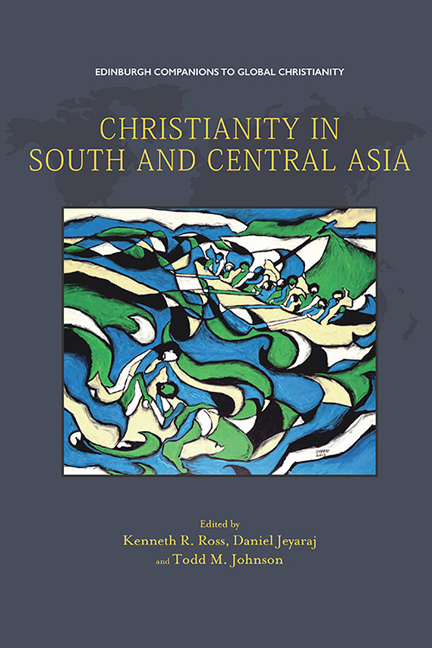Protestants and Anglicans
Published online by Cambridge University Press: 30 April 2020
Summary
Christianity has a very long history in South and Central Asia, and the strength of its presence and varieties of its manifestations in these regions have varied greatly over time. Ancient oral and written Christian traditions from India and Mesopotamia claim apostolic origins for the church in India, and contemporary historians believe that Christian communities have been present and flourishing in South India for more than 17 centuries. Central Asia was also home to Christian communities from a very early period. The Christian chronicler Bardaisan of Edessa, writing at the end of the second century, mentioned fellow believers in what today are the countries of Tajikistan and Uzbekistan. Such early dates for Christian presence in South and Central Asia are not surprising, since these regions were part of dynamic worldwide economic as well as political networks stretching from Western Europe to Southeast Asia. Buddhism, Christianity and Manichaeism spread along trade routes long before the expansion of Islam in the eighth century.
The earliest Christians of South and Central Asia were culturally quite different from Christians in the Roman Empire. In fact, some of the liveliest and most prolific Asian Christian churches, such as the Church of the East, or ‘Nestorian’ Church, were deemed heretical by the Western church in the first few centuries of the Christian era. Yet Asian churches created numerous and vigorous Christian communities that by the seventh century were spread from Iran to China, India and Sri Lanka. While many of these Central and South Asian Christian communities have disappeared, others live on, thrive and multiply not only in their Asian contexts but around the world, as active members of the church universal.
Over the centuries, a number of other Christian traditions have established churches in South and Central Asia. These include the Roman Catholic Church, various Orthodox churches from both the Western and Eastern/Southern branches of Christianity, Protestant churches, and most recently Pentecostal and Independent churches. The long-term and variegated presence of Christianity in South and Central Asia makes it clear that Protestantism cannot be understood in isolation in this region of the globe. Protestants live in contact and conversation with a rich and diverse religious milieu and history.
- Type
- Chapter
- Information
- Christianity in South and Central Asia , pp. 248 - 260Publisher: Edinburgh University PressPrint publication year: 2019



